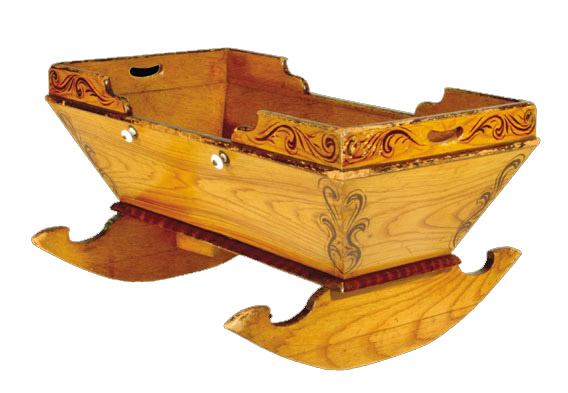Our collections are the real stuff that help us think and learn about our world.
Kauffman Museum’s earliest collections date from the beginning of Bethel College when faculty saw the need for a teaching museum and brought together artifacts from the central Kansas Mennonite community and natural history specimens of the plains environment. The December 1896 issue of Bethel’s School and College Journal announced that students and friends of the college had begun collecting for a Museum of Natural History and American Relics.
In 1939 the College invited Charles Kauffman to bring his museum from South Dakota, adding his personal taxidermy collection of prairie birds and mammals and his collection of cultural history artifacts to complement those at the college. Because Mennonites have become a world denomination with significant global connections through mission and development work, artifacts in the collections reflect on-going relationships with non-Western cultures.
Historical Artifacts and Specimens at Kauffman Museum
To Preserve and to Teach
Artifacts and specimens not on display are stored in Kauffman Museum’s Study Collections–a secure, temperature and humidity controlled environment. Study Collections are accessible by appointment for research or loans. Kauffman Museum also keeps unaccessioned items in its Teaching Collection for hands-on experiences.
Kauffman Museum’s collections serve as the foundation for our special exhibitions, from Threshing Stone: Mennonite Artifact & Icon to Meet the Beak. Extensive research on Mennonite immigrant furniture increased awareness of the history and value of these artifacts and resulted in Mennonite Furniture: A Migrant Tradition (1776-1910) by Reinhild and John Janzen (1992) and the museum collection being designated as an official “Save America’s Treasures” project.
The breadth of our collections is periodically shared through a “cabinet of curiosities” series of exhibitions such as Forgotten Florals: Decorative Discoveries from the Kauffman Museum Collections and Wheels: Transportation and Toys from the Collections.
Generations of Preservation
Kauffman Museum’s collections reflect the generosity of families who have donated heirlooms to the collections
• the Mennonite families who built the historic farmhouse and barn
• the van der Smissen family and the house cabinet organ of 1750 in the auditorium
• the Cheyenne families who entrusted items of traditional material culture to Mennonite missionaries who contributed these objects to our collections
• Kansans interested in exploring the natural and cultural history of the central plains
What We Collect
To discuss a possible donation, contact Museum Technician, David Kreider and review the Donation Guidelines.

Kauffman Museum gives preference to collecting artifacts relating to:
Mennonite History and Culture
• Their European origins, immigration to the North American Plains
• Immigrant furniture and personal artifacts
• Quilts
Cultures with Significant Mennonite relationship – mission and relief work
• Central India, central China, central Africa (Democratic Republic of Congo)
• Native Americans, especially the Cheyenne people (Tsistsistas)
History of Bethel College
• Academics
• Sports
• Student Activities
Courses offered by Bethel College
• World civilizations and religions
• Kansas and local history
• History of nursing
• Prairie ecology
Mennonite church history and life
• Congregational history
• Mennonite Central Committee history and activities
• Civilian Public Service

VISIT US
27th and North Main St.
North Newton, KS 67117
Across from the main campus of
Bethel College
CONTACT US
(316) 283-1612
kauffman@bethelks.edu
Mailing address:
300 E. 27th Street
North Newton, KS, 67117-1716
HOURS
Tue-Fri 9:30am-4:30pm
Sat-Sun 1:30pm-4:30pm
Closed Mondays and
Major Holidays
